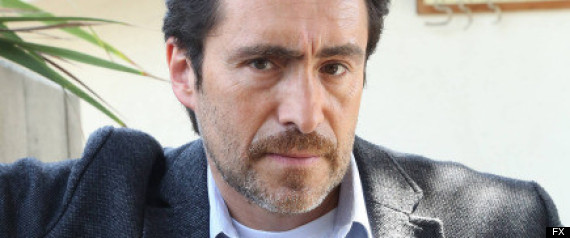
If all "The Bridge" did was bring Demian Bichir to wider attention in the United States, that would be reason enough to watch the show.
Fortunately there are many other promising elements holding up "The Bridge" (10 p.m. ET Wednesday, FX), which has been adapted from an acclaimed Scandinavian series by executive producers Ellwood Reid and Meredith Stiehm, a "Homeland" and "Cold Case" veteran.
As is the case with "Homeland," "The Bridge" has a topicality that makes the series hum with a low-key but unmistakable energy. The drama's stories of crime and corruption on the U.S.-Mexico border aren't ripped from the headlines in a cheesy way, but the show meditates on these topics in ways that allow it to resonate more than your average crime thriller. In this day and age, it's astonishing that so many mainstream movies and films avoid topics like immigration and fraught border relations, but "The Bridge" incorporates these issues into its ongoing story in thoughtful and suspenseful ways.
Bichir, however, is the main reason to tune in at first; his performance is quietly masterful and serves as a necessary anchor to the first three episodes, which are generally solid but exhibit some growing pains. Bichir plays Mexican Det. Marco Ruiz, who is paired with El Paso Det. Sonya Cross (Diane Kruger) after a body is found on the border. Without giving away too much, the case quickly becomes a complex, high-profile entity that confounds law enforcement in both nations, which, like the cops investigating the murder, regard each other with uneasy wariness. Mismatched cops forced to work together is one of the oldest TV tropes in the book, but "The Bridge" builds such a realistic, detailed world around the detectives here that the dynamic is often fresh.
Bichir's character -- a hangdog detective who tries to retain at least a few principles as he moves through a morally compromised world -- could have been a noir-ish cliche, but the actor makes Ruiz wonderfully specific and engaging. Ruiz is charming in ways that seem both calculating and instinctive, and the show makes it clear that his desire to steer clear of corruption makes him both brave and foolhardy. Ruiz is the kind of worn-out, flawed but almost noble guy for whom you instantly feel sympathy -- decades ago, Humphrey Bogart made a career of playing admirable cynics like him.
Ruiz's opposite number is a more problematic character in the early going, but it should be worth sticking around to see what the show does with Kruger's prickly detective. The press notes explain that Cross has Asperger syndrome (it's in the first sentence of the description of the detective), but the first three episodes of "The Bridge" make no mention of her condition. Certainly some people with Asperger syndrome remain undiagnosed into adulthood, but the problem is, the show doesn't quite know what to do with Cross and her social difficulties.
It's a little hard to believe, frankly, that Cross' abrupt behavior would have allowed her to make detective in the first place. She has an affable boss (well played by Ted Levine), and he covers for her in various ways, but Cross is so inept with witnesses and co-workers that it's hard to understand how those factors did not hold her back professionally. More problematically, her actions and her efforts to conform to social norms are viewed from a chilly remove, and that distance makes it hard to root for Cross when she's making mistakes, or even when she's trying not to. It's not necessarily a problem if Cross is a cipher to those around her; it could be a problem if she remains a brusque cipher to the show's audience.
"The Bridge" clearly has different aesthetic goals than the HBO film "Temple Grandin," but that movie did a far better job of putting the audience inside a similar character's worldview and making her intentions and her confusion palpable and dramatically compelling. Diane Kruger doesn't transmit the kind of emotional intensity that Claire Danes brought to the role of Grandin (and to her "Homeland" character, for that matter), and "The Bridge" doesn't do much to mitigate Kruger's efficient but cool approach. Ultimately, Cross' behavior begins to a bit seem predictable.
But there's time for the portrayal of Cross' character to deepen, and much of the mystery that "The Bridge" builds up around Ruiz and Cross is pleasurably complex. A couple of subplots are so cryptic as to be a bit confusing, but that's a minor quibble. In the first three episodes, we meet cops, reporters (very well played by Matthew Lillard and Emily Rios), a frightened widow and a host of other border characters who occupy a sand-blasted world full of hidden traps, divergent cultures and political hot potatoes.
It's certainly a world worth exploring further.
Note: Ryan McGee and I discussed "The Bridge" and Netflix's "Orange Is the New Black" on this week's Talking TV with Ryan and Ryan podcast, which is here, on iTunes and below. The podcast now also has its own Bingo card.
CORRECTION: A previous version of this post misspelled Demian Bichir's last name as "Birchir."

